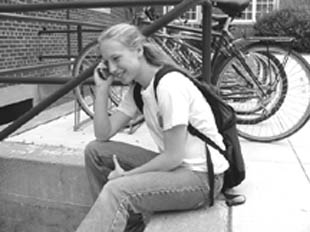Cell phone usage is all the buzz

September 26, 2002
Of course nobody would dream of going into a library with an alarm clock set to go off. Yet, many people chose to go to class, movie theaters and other quiet places with a cell phone.
Freshman Ellie Ankeny says she has witnessed several incidents of cell phone rudeness.
“I was in English and someone’s cell phone went off,” Ankeny said. “The professor didn’t get mad or anything, but I thought it was rude.”
During Ankeny’s Spanish class, the teacher’s cell phone rang.
“We had just started a discussion,” Ankeny said. “Maybe it was their kid or something. But, I think that if you’re in the middle of something you shouldn’t answer it. We pay good money for this education, and I definitely think people should not take calls during class.”
Freshman Laura Dillavou had a similar experience. The smaller classrooms at Simpson make the cell phone interruptions hard to ignore, she said.
“My biology class is kind of a serious class,” Dillavou said. “But this girl’s cell phone rings nearly every day. You’d think that she would learn to turn it off. The teacher doesn’t say anything but the girl always looks embarrassed because everyone stares at her.”
Which brings up the important question of what professors think about having phones in their classrooms.
Mark Freyberg, assistant professor of sociology, has had cell phones ring during class, but he is not bothered by them as long as the users are mindful of their actions.
“Usually they’ll just check something on the phone,” Freyberg said. “Sometimes they go in the hall and take the call. It doesn’t bug me as long as they’re considerate. I haven’t found anybody yet who wasn’t really polite about it.”
However, Ankeny has other thoughts on cell phone usage in public places.
“Any time I hear a cell phone go off it really annoys me,” Ankeny said. “At the library, the mall or movie theaters…At movie theaters it really kills me.”
“I have a friend who takes it to movies with her. It’ll just be ringing and ringing and ringing. And if that wasn’t embarrassing enough, she’ll have a conversation on it. If she misses the call she’ll call them back during the movie. It’s so embarrassing. If you feel like you have to have your phone with you, you should put it on vibrate or silent mode,” Ankeny said.
Charlotte Ford’s “Guide to Etiquette for the 21st Century” addresses the issue of cell phone usage in public places. Before taking a cell phone with you, the book says to ask these three questions:
* Do I have an urgent reason for taking it with me?
* Will it disrupt others?
* Can I make an alternate arrangement for messages through voice mail?
Ford’s book also points out that cell phone users should turn the phone off or switch it to vibrate at business meetings, restaurants and public places.
Ankeny agrees, but she says she also feels that students often use cell phones as a status symbol or show of popularity.
“People are less individual and more unsure. They use cell phones to make sure they can get a hold of someone.”
Freyberg said that cell phones can have a dual effect on their users.
“Like a lot of communication technology, it’s good in the sense that it can bring us closer together, but can leave us farther apart.”
“Now navy sailors can e-mail their family at home and feel closer to them,” Freyberg said. “But if cell phones are used to send a message to the guy next door, rather than going over there, that kind of use of technology is separating people,” said Freyberg.
Dillavou agrees that cell phones can inhibit meaningful interaction with those around you.
“You’re not as likely to stop and talk to other people if you’re always talking on your cell phone,” Dillavou said. “It makes your communication a lot less personal.”
While Freyberg does understand that many students carry cell phones with them, he said that he does not feel that the school needs a policy on limiting use in class.
“There’s no line in my syllabus that says ‘No cell phones,’ but the students basically know how to handle them,” Freyberg said.











